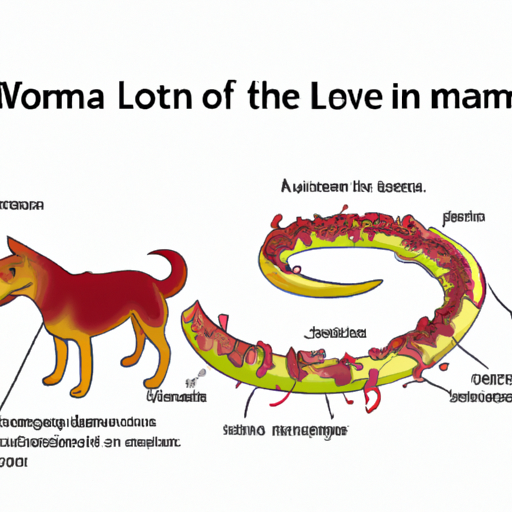Understanding Tapeworms
Dear caregiver, if you’ve noticed something unusual about your dog’s health, it’s crucial to take a second look. Tapeworms are parasitic flatworms that attach themselves to your dog’s intestines. They are segmented, white in color and can grow up to 28 inches long. Tapeworms are not a direct health risk, but they indicate that your dog has been exposed to fleas or infected wildlife, which could carry other diseases.
How Dogs Get Infected
You may wonder, “How does my dog get tapeworms?” Dogs become infected with tapeworms after swallowing a flea that has consumed tapeworm larvae, or by eating an infected rodent. The tapeworm then hooks itself onto your dog’s intestines, where it feeds and grows.
Here’s a typical scenario:
- Your dog ingests an infected flea while grooming.
- The flea is digested in your dog’s stomach.
- The tapeworm larvae is released.
- The larvae attaches to the intestines and grows into an adult tapeworm.
Symptoms of Tapeworms in Dogs
The symptoms of tapeworms in dogs can be subtle. You might notice:
- Restlessness
- Scooting or dragging their rear on the ground
- Vomiting
- Weight loss despite a healthy appetite
- Visible tapeworm segments in stool or near the dog’s rear
Treatment for Tapeworms
Treating tapeworms involves administering a deworming medication that kills the tapeworms. Your vet will prescribe the appropriate medication based on your dog’s size, age, and overall health.
| Age Group | Medication |
|---|---|
| Puppies | Praziquantel |
| Adult Dogs | Fenbendazole |
| Senior Dogs | Consult with your vet |
Preventing Tapeworms
Prevention is always better than cure. Keep your dog’s environment clean, regularly treat for fleas, and avoid allowing your dog to scavenge or consume rodents.
Here are some steps for prevention:
- Regular flea treatment
- Routine deworming
- Clean environment
- Regular vet check-ups
Frequently Asked Questions
Q: Can I get tapeworms from my dog?
A: It is rare, but humans can get tapeworms if they accidentally ingest an infected flea.
Q: Can tapeworms harm my dog?
A: While tapeworms are not directly harmful, they can cause weight loss, vomiting, and general discomfort.
Q: How long does treatment take?
A: Treatment typically takes a few days to a week.
Q: Can I prevent my dog from getting tapeworms?
A: Yes, by controlling fleas and avoiding exposure to infected rodents, you can prevent tapeworms.
Remember, your dog relies on you for their health and wellbeing. Stay informed, stay vigilant, and together we can keep our furry friends happy and healthy!



